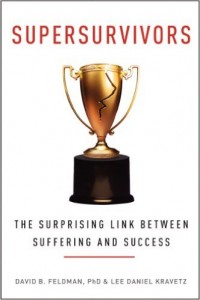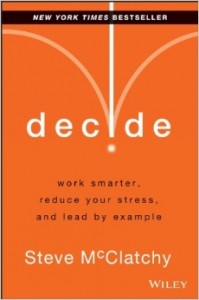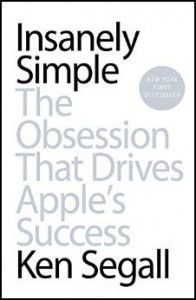LeadersTip: Clarify Your Job
“Who defines your job? Who decides what you do? The answer is pretty important, so it better be clear!”
“Who defines your job? Who decides what you do? The answer is pretty important, so it better be clear!”
 Both as a pastor and as a human being, I recognize the unfortunate truth is that we will have to deal with trauma, either our own or that of others around us. That’s just the reality of the world we live in. Supersurvivors gives us some insight into how we can prepare for that personally or help those around us more effectively.
Both as a pastor and as a human being, I recognize the unfortunate truth is that we will have to deal with trauma, either our own or that of others around us. That’s just the reality of the world we live in. Supersurvivors gives us some insight into how we can prepare for that personally or help those around us more effectively.
One of the things that struck me as I was reading was the importance of dealing with reality. Going through a trauma can completely undercut the possibility of pursuing the dreams one had; facing that honestly and asking the question “what now” can help a person get through that and move forward. I suspect, however, it’s much easier to say that to ourselves than to someone else. Saying it to someone else could easily feel cold-hearted. That is part of the challenge of coming alongside people.
The importance of forgiveness also struck me. I was intrigued with the idea that forgiveness means giving up the desire to change the past. I’ve never thought of it that way, but it makes sense to me. I’m going to think more about it, and think about how to use that to help people who are stuck in unforgiveness move forward.
What struck you? If you have gone through trauma, or walked others through it, is there anything you have observed that you would add to the list?
Dave Frederick
This week I share the one tip that has made the biggest difference of all in my productivity.
This week I share the one tip that has made the biggest difference of all in my productivity.
 I read many time-management and life-management books, as I am always looking for new insights into how to become more effective with my time and life. I found some helpful ones in Decide.
I read many time-management and life-management books, as I am always looking for new insights into how to become more effective with my time and life. I found some helpful ones in Decide.This week’s Leader’s Tip is about one secret weapon that every leader can use to help them stay on top of their game.
 In Simplify, Bill Hybels puts his finger squarely on the things that complicate our lives. I found the book insightful and helpful.
In Simplify, Bill Hybels puts his finger squarely on the things that complicate our lives. I found the book insightful and helpful.
In particular, I loved his point that, “If you choose to live with more energy reserves in your life, you will, without a doubt, disappoint some people.” That is so true! And understanding and embracing that truth is what allows us to move forward. Living with more energy actually takes work, discipline, and time. It takes time to get enough sleep; it takes time to exercise; it takes time to do the things that replenish us.
And that means less time for other things—things that people will think are important. I’ve seen people be accused of being selfish or being uncommitted to Christ because they chose to live with more energy. (That is really just people trying to manipulate others into doing what they want them to do.) But living with more energy reserves has tremendous benefits. The quality of your work, and your overall life, improves. You have the ability to stay in the game longer, rather than burning out and having to take a longer time out to recover. And over time, your productivity increases. It’s worth it to take the time to live with more energy.
I also thought it was insightful to recognize that when we do get depleted, it is natural for us to look around for someone else to fill us up. When you’re depleted, you lack energy, and it takes more energy to make the choices needed to get filled up again. But at the end of the day, it is our responsibility—and only ours—to fill our tank or to plug the leaks. It’s actually a setup for resentment when we look for others to do the things we need to do for ourselves.
When I think of simplifying, I usually think in terms of eliminating clutter or shortening my to-do list somehow. But Hybels brings in another angle that is significant: identifying and addressing the things that complicate our lives.
When our finances or relationships are not in order (for example), it complicates our lives. The fear and worry, and the time it takes to deal with those types of things, can suck the life right out of us. It takes time to put things right and time to keep them in order, but the peace it brings into every area of our lives is worth it. There is an energizing freedom that comes when we aren’t worrying or stressing about those areas.
I think Hybels hits the nail on the head when he says that it is more about what kind of person we want to be than what we want to get done. That helps us focus on the things that are most important, which will have the biggest impact over time. Simplifying life with this framework in mind is a powerful paradigm for a more peaceful and more productive life.
What are your thoughts, questions and insights?
I was quite surprised at how many ideas in Insanely Simple apply to the church. Who would have guessed that the church could learn a lot f rom Apple and Steve Jobs? Ken Segall does a great job of looking at the power of Apple’s commitment to Simplicity and the very real challenges and benefits of trying to live out that commitment.
rom Apple and Steve Jobs? Ken Segall does a great job of looking at the power of Apple’s commitment to Simplicity and the very real challenges and benefits of trying to live out that commitment.
Almost every chapter had solid take-aways for anyone leading a church or ministry. I’ll focus on a couple that really stood out to me.
I loved this quote regarding why Apple doesn’t multiply products like so many other companies:
“They seem to forget that trying to please everyone is a good way to please no one. Choosing the path of Simplicity, Apple elects to do just a few things but do them incredibly well.”
How different from the way so many of our churches operate. We often add program after program after program until we have more things going than we can keep track of, much less actually staff effectively. Our motives are usually good—we see real needs and want to meet them. But the reality is that no church can do everything. It’s better to do a few things well than a lot of things in a poor or mediocre way.
Our inability to say no to new programs or ideas is one reason so many pastors and leaders suffer burnout and why so many volunteers follow our lead. Most volunteers in church can give one time slot per week to the church—one evening, one weekend afternoon, etc. When we let programs proliferate, we often end up putting pressure on people to do more (because we have to keep the programs going). Our most committed people will often step up, but in the long run, they too will burn out, get resentful, or just disappear, because they can’t maintain that pace. In the worst cases, it becomes almost abusive, and people feel used and uncared for. Ironically, it can be very unloving to say yes to every ministry opportunity, because of what it costs our volunteers.
I also noted his comments on how Apple communicates. He used their marketing as an example, but it applies to their internal communication as well. For me, the application to our preaching and teaching in the church was obvious. Segall said:
“Apple didn’t describe the original iPod as a 6.5-ounce music player with a five-gigabyte drive. It simply said, ‘1,000 songs in your pocket.’ This is the way human beings communicate, so this is the way Apple communicates.”
While that sounds so obvious, I think it’s actually pretty hard. It takes work and a real commitment. It reminds me of some Olympic figure skaters or gymnasts—they often make what they are doing look effortless. The truth is that it takes an incredible amount of work to make things look so easy!
The same is true for our teaching. It’s easy to fall into using jargon—language that most people never use outside of Sunday mornings. It takes work to communicate biblical truths in ways people can understand. It’s easy to speak in ways that communicate only with people’s minds and never touch their hearts; it takes work to go beyond that and find the right story, the right illustration, or the right words to go deeper.
Besides helping people understand what we are saying on a deeper level, we are also equipping them to talk to others. If we use language on Sundays that they don’t use on Mondays, they either won’t tell others what they are learning or they won’t know how to communicate it effectively. But if we are speaking their language, they will be able to talk to others. It will be much more natural and more common.
I think our churches have a bias toward being more complex than is helpful or needed. Simplifying what we are doing has multiple benefits beyond the few I mentioned. Who would have guessed that the church can learn from Apple? I certainly have!
What has been your experience in this area of complexity and simplicity? Have you tried to simplify what you’re doing? How did it go? I would love to hear your thoughts.


